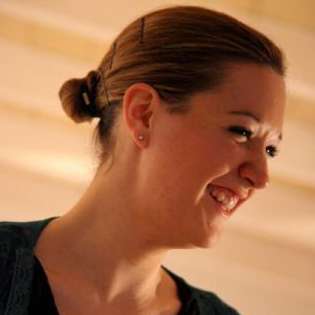It is not unusual to hear a child gasp at a clever stage trick, but far more unusual to hear an audience of adults do the same. Yet that is what happened again and again during this ingenious production, which cleverly utilises a range of narrative tools – words, music, movement and stagecraft – to tell a beloved tale clearly and ingeniously. Eleven years on, Will Tuckett’s production has lost none of its power to enchant.
Kenneth Grahame’s seminal work doesn’t necessarily lend itself to drama, constructed as it is around a series of artless vignettes. This problem is largely solved in the stage adaptation by the introduction of a unifying factor: Grahame himself, a role now inhabited by fellow national treasure Tony Robinson. A cunning plan indeed. The first half still lacks momentum on occasion, but there are plenty of distractions to fill its absence.
Chief of which is several winning central performances. Clemmie Sveaas brings a grave naïveté to good, honest Mole, with an endearing waddling shuffle that gives way to eager jumps and finally a lovely soft elegance in the air as Mole is lifted out of solitariness by forming such firm friendships. Will Kemp is a wonderfully expressive Ratty, combining the debonair charm of a silent movie actor with a leonine grace and exquisite pirouettes. As the bond between them grows, they literally move in step, with beautiful transitions in their partner work.
The star of the show is Cris Penfold’s irrepressible Toad, almost bursting at the seams with childlike enthusiasm. Penfold has gloriously explosive elevation, keen musicality and a gift for comically angular slapstick. When he first spies the motor car, he hurls himself into a squat, arms locked in the steering position as he tries to embody it, and when he’s imprisoned, that jittery energy mutates into poignant physical yearning, limbs splaying hopefully through the bars of his cage.
Christopher Akrill’s Badger, in contrast, favours sinuous, subtle movement, a nice reflection of the character’s wariness and world-weary irascibility. However, once enticed into a competitive pas de trois with Mole and Ratty, his posture transforms, his steps become crisper and, between them, they create dynamic shaping and intricate interplay. Tuckett has found a brilliant way of allowing the characters to dictate movement without constricting it.
The choreography has splendid support from Martin Ward’s score – which builds on George Butterworth’s pastoral sound – and the Quay Brothers’ outstanding design. A whole world is evoked through a multitasking set, with a wardrobe and rocking horse forming a caravan, an oversized chair a prison, and a cabinet spilling forth floating silk that becomes the river. The puppetry is sometimes underwhelming, but adds to the feel of a lovingly crafted piece.
The combination of elements however, while giving something for everyone, also limited the impact of each one. This is not a true ballet, more a movement piece, and there may be viewers wishing for either more extensive dance sequences or less altogether. Some dance fragments have gripping narrative drive, while others are more elegiac, but their exploration is usually cut short.
Similarly, Andrew Motion’s comforting narrative would make a perfect bedtime story, but sometimes competes with the dance in terms of pacing, with one turning the page while the other is caught mid-jété. This might be less of an issue with a different Grahame – Robinson, while indisputably affable, is essentially introducing an episode of Time Team, more curator than creator, and tends to shift the tone whenever he appears.
Nevertheless, this is a curiously moving portrait of a lost idyll; Conservative leanings aside, its lament ‘If only we could stop the flow of time and dream’ is hard to argue with, particularly when our protagonists are such likeable fellows and the invading yobbish weasels such snivelling, preening punks. In our heroes’ darkest hour, carollers appear to cheer them, accompanied by falling flakes of fake snow, which, in a coup de théâtre, also fell on us as we left the theatre. For a moment, we thought the dream was real, and it was a truly joyous moment.


